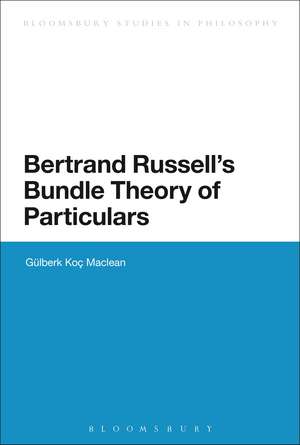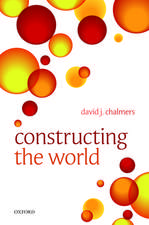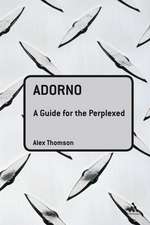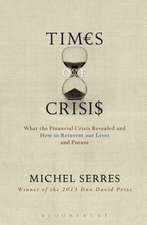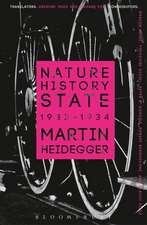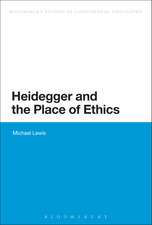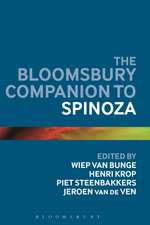Bertrand Russell's Bundle Theory of Particulars: Bloomsbury Studies in Philosophy
Autor Gülberk Koç Macleanen Limba Engleză Hardback – 12 mar 2014
| Toate formatele și edițiile | Preț | Express |
|---|---|---|
| Paperback (1) | 255.47 lei 6-8 săpt. | |
| Bloomsbury Publishing – 23 sep 2015 | 255.47 lei 6-8 săpt. | |
| Hardback (1) | 772.24 lei 6-8 săpt. | |
| Bloomsbury Publishing – 12 mar 2014 | 772.24 lei 6-8 săpt. |
Din seria Bloomsbury Studies in Philosophy
- 13%
 Preț: 257.50 lei
Preț: 257.50 lei - 13%
 Preț: 256.77 lei
Preț: 256.77 lei - 22%
 Preț: 256.20 lei
Preț: 256.20 lei - 22%
 Preț: 257.03 lei
Preț: 257.03 lei - 13%
 Preț: 255.47 lei
Preț: 255.47 lei - 22%
 Preț: 237.28 lei
Preț: 237.28 lei - 22%
 Preț: 257.50 lei
Preț: 257.50 lei - 22%
 Preț: 773.81 lei
Preț: 773.81 lei - 13%
 Preț: 256.20 lei
Preț: 256.20 lei - 22%
 Preț: 258.89 lei
Preț: 258.89 lei - 13%
 Preț: 255.11 lei
Preț: 255.11 lei -
 Preț: 256.20 lei
Preț: 256.20 lei - 22%
 Preț: 772.58 lei
Preț: 772.58 lei - 22%
 Preț: 240.50 lei
Preț: 240.50 lei - 22%
 Preț: 257.03 lei
Preț: 257.03 lei - 23%
 Preț: 255.84 lei
Preț: 255.84 lei - 23%
 Preț: 255.29 lei
Preț: 255.29 lei - 13%
 Preț: 237.28 lei
Preț: 237.28 lei - 13%
 Preț: 235.00 lei
Preț: 235.00 lei -
 Preț: 258.42 lei
Preț: 258.42 lei -
 Preț: 256.49 lei
Preț: 256.49 lei - 14%
 Preț: 773.06 lei
Preț: 773.06 lei - 30%
 Preț: 774.03 lei
Preț: 774.03 lei - 30%
 Preț: 774.20 lei
Preț: 774.20 lei - 30%
 Preț: 774.86 lei
Preț: 774.86 lei
Preț: 772.24 lei
Preț vechi: 989.55 lei
-22% Nou
Puncte Express: 1158
Preț estimativ în valută:
147.77€ • 158.02$ • 123.21£
147.77€ • 158.02$ • 123.21£
Carte tipărită la comandă
Livrare economică 18 aprilie-02 mai
Preluare comenzi: 021 569.72.76
Specificații
ISBN-13: 9781472512666
ISBN-10: 1472512669
Pagini: 184
Ilustrații: 20 illus
Dimensiuni: 156 x 234 x 13 mm
Greutate: 0.44 kg
Ediția:New.
Editura: Bloomsbury Publishing
Colecția Bloomsbury Academic
Seria Bloomsbury Studies in Philosophy
Locul publicării:London, United Kingdom
ISBN-10: 1472512669
Pagini: 184
Ilustrații: 20 illus
Dimensiuni: 156 x 234 x 13 mm
Greutate: 0.44 kg
Ediția:New.
Editura: Bloomsbury Publishing
Colecția Bloomsbury Academic
Seria Bloomsbury Studies in Philosophy
Locul publicării:London, United Kingdom
Caracteristici
Shows why Russell's bundle theory provides a strong basis for a tenable contemporary bundle theory
Notă biografică
Gülberk Koç Maclean is Contract Faculty at Mount Royal University, Canada. She writes on Metaphysics and Epistemology.
Cuprins
PrefaceAcknowledgementsList of abbreviationsIntroduction: Setting the metaphysical scene Chapter 1 The substratum theory (1903-1940) Chapter 2 The bundle theory (1940-1948) Chapter 3 The epistemology of the bundles: non-demonstrative inference Chapter 4 The problem of individuation Chapter 5 The problem of necessity Chapter 6 The problem of analyticity Chapter 7 Neutral monism Chapter 8 Logical atomism Conclusion
Recenzii
Russell's later philosophy has been scandalously ignored, and no part of it more so than his final metaphysics in which he treated particulars as bundles of universals. This almost total silence about Russell's bundle theory is now remedied by Gülberk Koç Maclean, whose book provides a detailed exposition of the theory and defends it against the standard charges made against bundle theories of particulars. Her books fills an important gap in the literature on Russell. Hopefully, it will stimulate further work on Russell's later philosophy.
The great value of this book lies in its exquisite critical exploration of the evolution of Russell's theories of universals and particulars. What topic is more central to philosophy and to Russell scholarship? It is not often appreciated that Russell redesigned his construction of matter in Human Knowledge: Its Scope and Its Limits. This book expertly guides us through it, preserving the integrity of Russell's logical atomism and neutral monism amidst the changes. Events give way to bundles. "A transient particular is a complex of compresence.. the coexistence of certain qualities." Whether any bundle theory of particulars may be viable can only be known by reading this excellent chronicle of Russell's engagements with the horary difficulties about the one and the many.
The great value of this book lies in its exquisite critical exploration of the evolution of Russell's theories of universals and particulars. What topic is more central to philosophy and to Russell scholarship? It is not often appreciated that Russell redesigned his construction of matter in Human Knowledge: Its Scope and Its Limits. This book expertly guides us through it, preserving the integrity of Russell's logical atomism and neutral monism amidst the changes. Events give way to bundles. "A transient particular is a complex of compresence.. the coexistence of certain qualities." Whether any bundle theory of particulars may be viable can only be known by reading this excellent chronicle of Russell's engagements with the horary difficulties about the one and the many.
